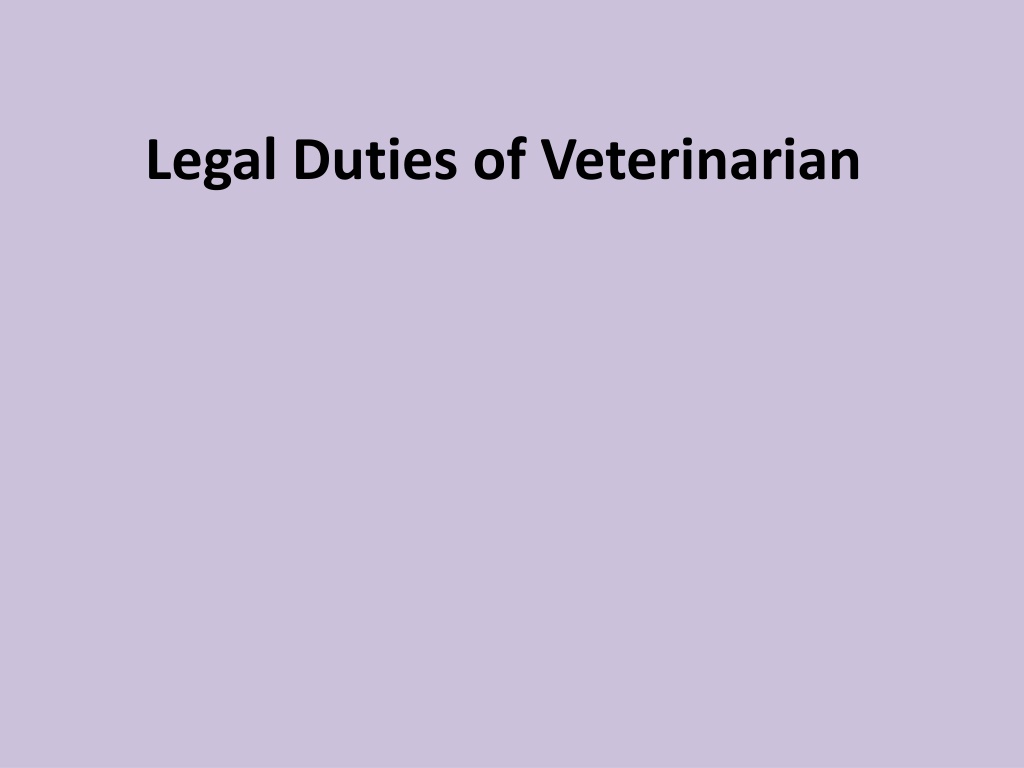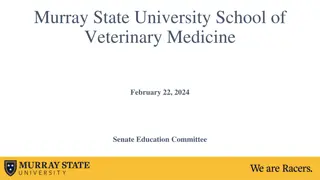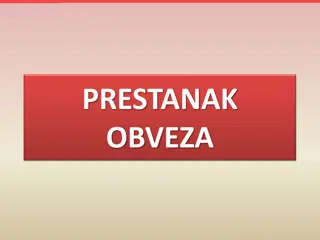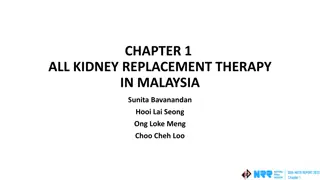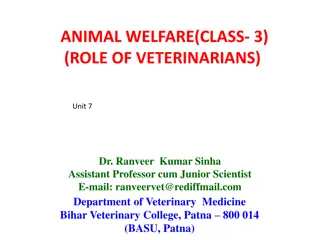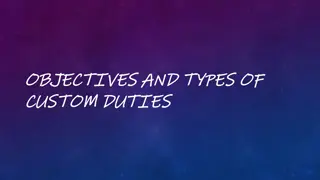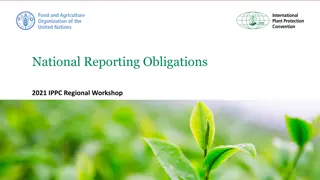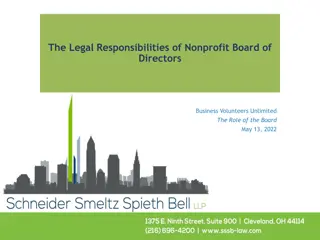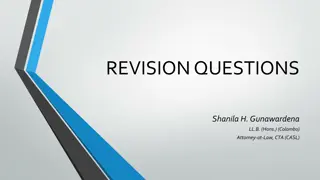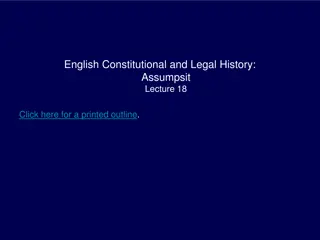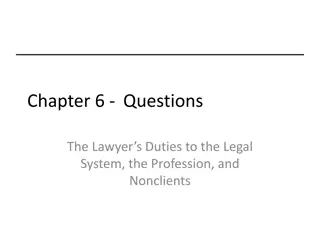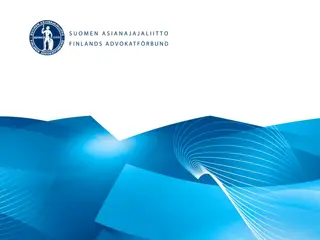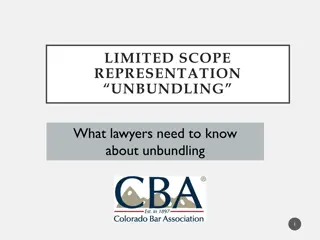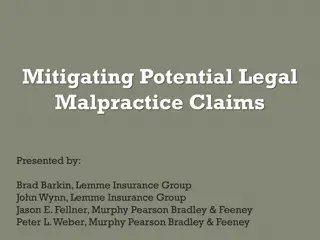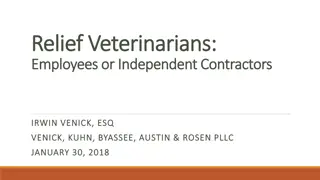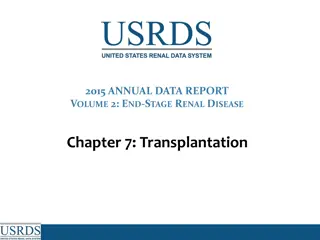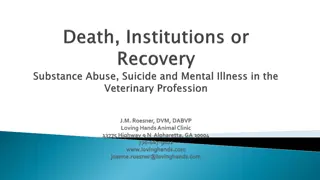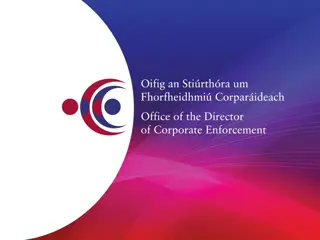Legal Duties of Veterinarians: Obligations to Clients and Patients
Veterinarians have legal duties towards their clients and patients, including obligations to provide care in emergencies, not to neglect patients, and to withdraw services under valid reasons. They must not commit acts of negligence that deprive patients of necessary care and are expected to demonstrate diligence, skill, and use standard practices in their profession.
Download Presentation

Please find below an Image/Link to download the presentation.
The content on the website is provided AS IS for your information and personal use only. It may not be sold, licensed, or shared on other websites without obtaining consent from the author. Download presentation by click this link. If you encounter any issues during the download, it is possible that the publisher has removed the file from their server.
E N D
Presentation Transcript
A- DUTIES OF VETERINARIAN TO THEIR CLIENTS AND PATIENTS 1- Obligation to the patient.- Although veterinarian is not bound to treat cases of each and every one asking for his/her service, except in emergencies, he/she shall for the sake of humanity and the noble tradition of the profession, not only be ever ready to respond to the need of the sick and injured animals/birds, but shall also be mindful of the high character of his/her mission and the responsibility he/she incurs in the discharge of his/her professional duties.
2- Patient not to be neglected. A veterinarian is free to choose whom he/she will serve, provided that he/she shall respond to any request for his/her assistance in an emergency or whenever temperate public opinion expects the service. Once having undertaken a case, a veterinarian shall not neglect the patient nor shall he/she withdraw from the case without giving notice to the client sufficiently in advance, to allow him secure another professional veterinarian.
3-Termination of service.- a) A veterinarian shall withdraw his/ her service under following valid reasons:- (i) Where he/she finds another veterinarian in attendance. (ii) Where remedies/advice other than those prescribed by him/ her are being used. (iii) Where his/her remedies/advice and instructions are refused. (iv) Where he/she feels that the illness or the need of his/her service is an imposture and that he/she is being made a party to a false pretence. (v) Where a client is resorting to the use of intoxicating drugs, means of quackery or witchcraft against medical advice; and (vi) Where complete information/history concerning the fact and circumstances of the case are not supplied by a client. (b) The discovery that the malady is incurable/the client's problems are unsolvable, is no excuse to discontinue attendance by a veterinarian as long as his/her client desire the service.
4- Act of negligence (I) No veterinarian shall willfully commit an act of negligence that may deprive patient of the care that is absolutely necessary. (2) A veterinarian is expected to show such diligence and skill in service as would be expected of another veterinarian of similar qualifications, experience and attainments. (3) His / her acts of commission or omission shall not be judged by any non-veterinary standards, but as those expected from a veterinarian of his/her training, standing and experience. (4) A veterinarian shall use any drug prepared under standard pharmacological principles and preparations/precautions, like sterilization and verification of doses as are normally prescribed for that drug. shall adopt all 'necessary
5-Behaviour to patients. The demeanour of a veterinarian toward his/her patient shall always be kind, tender and full of patience. Every patient shall be treated with attention, consideration and concentration.
6-Visit Not withstanding the fact that a veterinarian is not bound to visit his/her patient/client, he/she shall make it at the indicated hour, once he/she had committed to do so.
7- Prognosis (a) A veterinarian shall neither exaggerate nor minimize the gravity of a patient's condition. He/she shall ensure that the legal owner of the patient has such knowledge of the patient's condition as will serve the best interest of the and its owner (client). (b) In case of dangerous manifestations, or when grave and highly communicable diseases are encountered he shall not fail to inform the client and those to whom the disease can be of potent danger.
B- DUTIES OF VETERINARIANS TO THE PROFESSION 1- Upholding the honour of the profession. A veterinarian is expected to uphold the dignity and honour of his profession. 2. Membership of societies. For the advancement of his/her profession a veterinarian may affiliate himself/herself with professional societies and contribute his/ her time, means and energy to their progress, so that they may represent and promote the ideals of the profession better.
3- Safeguarding the profession. Every veterinarian shall laid in safeguarding the profession against admission to it of those who are deficient in moral character or education. He/she should not employ in connection with his/her professional practice any unqualified personnel to treat or perform operation upon patients. 4. Exposure of unethical conduct. Exposure of unethical conduct on the part of any member of the profession shall be done without fear or favour. The incompetent, corrupt, dishonest or unethical conduct on the part of any member of the profession shall be discouraged at any cost.
5- Appointment of substitute. Whenever a veterinarian requests another veterinarian to attend to his/her patient/ clients during his/her temporary absence from practice professional courtesy requires the acceptance of such an appointment by the latter, if consistent with his/her other duties. The veterinarian under such appointment shall give utmost consideration to the interest and reputation of the 'absent' veterinarian. He/she shall not charge either the patient or the absent veterinarian or his/her services, except in case of special arrangement between them. All such patients shall be restored to the care of the absent veterinarian upon his/her return.
6- Professional services of veterinarians to one another. (1) There is no rule that a veterinarian shall not charge another veterinarian or a member of a sister profession for service rendered. But a veterinarian shall consider it a pleasure and privilege to render gratuitous service to his/her professional brethren, if they are in his/ her vicinity, or to a veterinary student. (2) When a veterinarian is called from a distance to attend to a case of a fellow veterinarian or a member of a sister profession, reimbursement shall be made for travelling and other incidental expenses. (3) A veterinarian called in any emergency to visit a patient under the care of another veterinarian, shall when the emergency is over, retire in favour of the latter; but shall be entitled to charge the client for his/her services. (4) When a veterinarian is consulted at his/her own residence, it is not birding on him/her to enquire if the patient has been under the care of another veterinarian. But in the interests of the patient he/she shall, while ascertaining history, go through the treatment followed if any. However, it is unethical that his information be used to malign or instigate against, directly or indirectly, the veterinarian who happened to attend on the patient previously. When a veterinarian sees a patient at the request of another veterinarian, it shall be the duty of the first veterinarian to write a letter to the veterinarian making the request stating his/her opinion of the case with the modes of treatment he/she thinks proper to be adopted.
7- OTHER DUTIES (1) If a veterinarian is engaged to attend on a patient of dystokia or a similar distress he/she shall do so. Refusal to do so under excuse of another engagement is unethical except when he/ she is already engaged in similar or another serious case(s). (2) When a veterinarian engaged to attend a serious case is absent and another veterinarian is sent for, the latter shall be entitled to legitimate fees; provided that he/she shall secure the client's consent to withdraw on arrival of the former at a mutually consented or logical phase. (3) When it becomes the duty of a veterinarian occupying an official position to see and report on an illness or injury or any other professional problems concerning a patient, he/she shall do so, but communicate to the veterinarian in attendance, so as to give him/her an option to be present. The former shall avoid remarks on the diagnosis or treatment that has been adopted. This does not prevent him/her from discussing the matter with the later in isolation.
C- DUTY OF PRACTITIONERS IN CONSULTATION 1- Consultation shall be encouraged. In case of serious illness/doubtful or difficult conditions, a veterinarian shall always request consultation; he/she shall also do so in the case of major surgical interventions, out break of herd diseases, poisoning, endemics or undiagnosible situations. 2- Punctuality in consultations. Punctuality shall be observed by a veterinarian in attending a consultation. If a consultant veterinarian does not arrive within reasonable time, keeping in view the distance he/she has to travel and other relevant factors the consulting veterinarian shall be at liberty to see the patient; provided that he/she shall leave his/her conclusion in writing in a closed envelope. The same rule is applicable if the consulting veterinarian fails to turn up in time.
3- Patient referred to another veterinarian. (1)When a patient is referred to another veterinarian, a statement of the history, observation, clinical and laboratory examination as well as the tentative treatments undertaken shall be given. (2) On receipt of the above statement the veterinarian receiving the referred case shall communicate his/her opinion to the attending veterinarian and either shall continue the treatment as per his/her opinion or return the case along with his/her opinion communicated. 4- Consultation for patient's benefit In every consultation, the benefit of the patient shall be of prime importance. It should not. be done with an ulterior motive of evasion of responsibilities or on monetary considerations.
5- Conduct of consultation (1) In consultation there shall be no place for insincerity, rivalry or envy. All due respect shall be shown to the veterinarian in charge of the case and no statement or remark shall be made which would impair the confidence reposed in him/her by the client. For this purpose no such discussion shall, therefore, be made before the client. (2) All statements to the client shall be made in the presence of consulting veterinarian, except Announcement to the client also shall be made by the consulting veterinarian to the extent possible. (3) Difference of opinion shall not be divulged unless both feel that it would be in the interest of the patient or dignity of the profession. (4) It shall be open to the client to take further advice and the consulting veterinarian with the consent of the client may consult yet another veterinarian, the rules of ethics remaining the same. as otherwise agreed.
6- Cessation of consultation. Attendance of consulting veterinarian shall cease when consultation is concluded; unless another appointment is arranged by the attending veterinarian. 7- Treatment after consultation. (1) No decision shall restrain the attending veterinarian from making such subsequent variation inthe treatment as any unexpected change or development may demand; provided that at the next consultation, reasons for variations are stated. (2) The same privilege, with its obligations, belongs to the consultant when sent for in an emergency during the absence of attending veterinarian. The attending veterinarian may prescribe at any time; but the consultant only in case of emergency or instant need. All treatments by both shall be stated to each other.
8- Consultant not to take charge of the case When a consultant veterinarian is called upon to be consulted, none but the rarest and most exceptional circumstances shall justify the consultant taking charge of the case. He must not do so merely on solicitation of the client of his representative. 9- Bar on consulting non-registered veterinary practitioners No veterinarian shall have consultation with a veterinary practitioner who is not registered.
D- DUTIES OF VETERINARIANS TO THE PUBLIC 1- Veterinarian as citizen. Veterinarians as good citizens possessed of special training, shall advise concerning the health and husbandry of the animals, in the localities wherein they dwell. They shall play their part in enforcing the laws of the community (not involving any communal overtones or prejudices) and in substantiating the institutions that advance the interests of humanity. They shall cooperate with the authorities in the observance and enforcement of sanitary laws and the laws relating to drugs poisons and pharmacy, made for the protection of health.
2- Public health A veterinarian engaged in public health work shall enlighten the public concerning quarantine regulations and measures for the prevention of epizootic, zoonotic and food borne diseases and intoxications and communicable diseases. At all times, the veterinarians shall notify the respective authorities of every case of communicable diseases under their care in accordance with the laws, rules and regulations of the authorities. When an epidemic prevails, the veterinarian shall continue his/her labour without regard to the risk to his/her own health. He/She shall endeavour to ensure hygienic handling of animal products and wa'stes thereof and educate the public of food-borne diseases and intoxications.
3- Livestock production and technology A veterinarian shall strive for the betterment of animal production through timely advice/propaganda on scientific management involving economically viable and hygienic housing, adoption of scientific breeding schedule, disease prevention of routines, reproductive health monitoring, hygienic and systematic care before, at and following parturition, care of new born, hygienic collection of farm products and proper disposal of animal products and wastes thereof. He/She should strive to educate the public and paraveterinary staff personnel regarding timely insemination and aseptic handling during A.I. and discourage the unscientific unhygienic inseminations.
